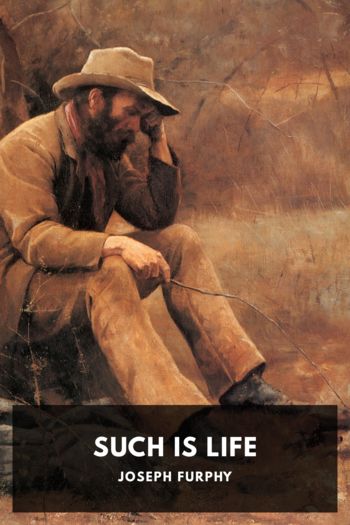Such Is Life - Joseph Furphy (philippa perry book txt) 📗

- Author: Joseph Furphy
Book online «Such Is Life - Joseph Furphy (philippa perry book txt) 📗». Author Joseph Furphy
Next day, following Andrews’ directions, I took the faint track of the ration cart for seven or eight miles, and found a tank without any trouble. (Remember that this is a recital of what happened long before the date of our record.) Early next morning, Dan O’Connell joined me, and we crawled along for another five or six miles, on a still fainter track, marked only by a few trips of the contractor’s wagonette. In the afternoon we struck a line of bored posts, and dumped twenty coils. In due time, I unyoked, and Dan led me to a new tank, half-full of horribly alkaline water. Thence, after arranging to meet me in the morning, he cut across to his own boundary hut, six or eight miles away.
Next day, still following the line of posts, we dropped the rest of the wire; and, before Dan left me, I made him repeat again and again his directions for finding a gilgie, which he knew to be full of first-class water, and which I ought to strike about sunset. Next day I would reach the station in good time, thus completing a loop journey of thirty-odd miles in four days.
Dan had impressed me as a person likely to be of considerably more account in the estimation of his Maker than of his fellow-products; and, having previously studied men of the same description, I now accepted this involuntary sentiment as the only way of accounting for something not unfamiliar in his voice and bearing. A man of average stature, with a vast black beard, and guileless blue eyes, set off by a powerful Armagh accent. Evidently unobservant, uncritical, and utterly destitute of devil in any form, it seemed that the Spirit of the Bog had followed him into the bush, preserving his noxious innocence and all-round ineptitude in their pristine integrity. Naturally, he had taken a slight local colour, but this seemed to express the limit of his susceptibility to altered conditions.
Yet he twice startled me by the breadth and exactness of his information—once when America was mentioned, and he glanced at the character and policy of each President, from Washington to Van Buren; and again, when he spoke of the Massacre of Cawnpore, almost as if he had been there at the time. Also, an unconscious familiarity with the Bible and Shakespeare was noticeable in his conversation, though he was evidently a Catholic of the Catholics.
When I complimented him on his erudition, he remarked, with amusing incompatibility of dialect and manner, “Mebbe it’s thrue fur ye. Me father hed consitherable mains, so he hed; an’ A har’ly ivver done a han’s turn, furbye divarsion, to A come out here.” However, you will now understand why I made him repeat his topographical notes half a dozen times before I let him go.
Just at sunset I struck the partly-plain patch of sixty or eighty acres, where the gilgie ought to be. I unyoked with despatch, then left the bullocks, and rode round, looking for a clump of mallee, which would indicate the immediate neighbourhood of the water. No use. I could find no mallee anywhere. Night came on—richest starlight, though, of course, dark in the scrub—and still I objurgated round, and purposely scattered the bullocks to search for themselves, and anathematised in all directions, and consigned the whole vicinity to the Evil One, for lack of that clump of mallee. Hour after hour passed; the bullocks from time to time trying to clear off for the distant Lachlan, and I spending half my time in using them as divining rods, and the other half in execrating back and forward in search of that mallee. It was about midnight when I gave it best. I must have struck the wrong spot. Now—would it be advisable to make a beeline to the station at once, with the bullocks loose?—or to wait for morning and take the wagon with me? The distance was eight or ten miles.
I was standing near the edge of the open scrub, with the reins over my arm. The mare was famished and exhausted. The bells were almost silent, for the bullocks stood still in the agony of thirst. The weather was hot; and they had barely sipped the alkaline water at last camp. I was absently observing one white bullock close by, when, with a low bellow, he suddenly darted forward eight or ten yards, and began drinking at the gilgie. That bellow was answered from all sides; and in two minutes his nineteen mates were sharing the discovery. Meanwhile, I had let Fancy go amongst them, after putting on her bell, and taking off the saddle and bridle. I had done with her for the night. And I knew that the water was good, for all the beasts stood on the brink, and drank without wetting their feet.
But how had the first bullock found the water, after he and his mates had passed it a dozen times, and within a few yards? This was worth investigating at once. So, before thinking about supper, I went to the exact spot where the beast had been standing, and there saw the stars reflected in the water. Of course, if it had been anything like a permanent supply, the sound of frogs or yabbies would have guided the beasts to it at once. But even wild cattle can no more scent water than we can, though they make better use of such faculties as they possess. I have tested the supposition deliberately and exhaustively, time after time; and this instance is cited, not controversially, but because it





Comments (0)